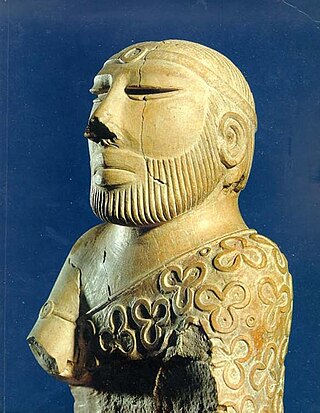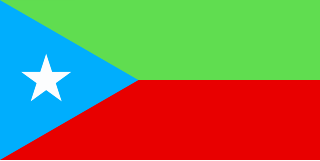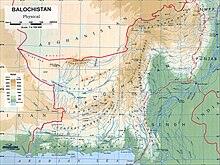
Balochistan is a province of Pakistan. Located in the southwestern region of the country, Balochistan is the largest province of Pakistan by land area but is the least populated one. It is bordered by the Pakistani provinces of Khyber Pakhtunkhwa to the north-east, Punjab to the east and Sindh to the south-east; shares international borders with Iran to the west and Afghanistan to the north; and is bound by the Arabian Sea to the south. Balochistan is an extensive plateau of rough terrain divided into basins by ranges of sufficient heights and ruggedness. It has the world's largest deep sea port, the Port of Gwadar lying in the Arabian Sea.

The Baloch or Baluch are a nomadic, pastoral, ethnic group which speaks the Western Iranic Baloch language and is native to the Balochistan region of South and Western Asia, encompassing the countries of Pakistan, Iran, and Afghanistan. There are also Baloch diaspora communities in neighbouring regions, including in Central Asia, and the Arabian Peninsula.
Nawab Nauroz (Nowroz) Khan (1868?–1965), also known by Balochs as Babu Nowroz, was the head of the Zarakzai (Zehri), a subject to the Khan of Kalat in Balochistan, Pakistan. After his unsuccessful insurgency against the government of that time he was imprisoned in Kohlu jail where he died in 1965.

The National Awami Party (NAP), translated from Urdu to English as National People's Party, was the major left-wing political party in East and West Pakistan. It was founded in 1957 in Dhaka, erstwhile East Pakistan, by Abdul Hamid Khan Bhashani and Yar Mohammad Khan, through the merger of various leftist and progressive political groups in Pakistan. Commonly known as the NAP, it was a major opposition party to Pakistani military regimes for much of the late 1950s and mid-1960s. In 1967 the party split into two factions.

The history of Balochistan refers to the history of the Balochistan region of Pakistan, Iran and Afghanistan. Vague allusions to the region were found in Greek historical records of around 650 BCE. Prehistoric Balochistan dates to the Paleolithic.

The Chief Commissioner's Province of British Baluchistan was a province of British India established in 1876. Upon the creation of Pakistan it acceded to the newly formed state. It was part of the Baluchistan Agency. It was dissolved to form a united province of West Pakistan in 1955 upon the creation of One Unit Scheme.

The Khanate of Kalat was a Brahui Khanate that originated in the modern-day Kalat region of Pakistan. Formed in 1666 due to the threat of Mughal expansion in the region, it controlled the wider Balochistan at its greatest extent in the mid-18th century, extending from Kerman in the west to Sindh in the east and from Helmand River in the north to the Arabian Sea in the south. The Khanate of Kalat lost considerable area to Qajar Iran and the Emirate of Afghanistan in the early 19th century, and the city of Kalat was itself sacked by the British in 1839. Kalat became a self-governing state in a subsidiary alliance with British India after the signature of the Treaty of Kalat by the Khan of Kalat and the Baloch Sardars in 1875, and the supervision of Kalat became a task of the Baluchistan Agency. Kalat was briefly independent from 12 August 1947 until 27 March 1948, when its ruler Ahmad Yar Khan acceded to Pakistan, making it one of the Princely states of Pakistan.

Ghaus Bakhsh Bizenjo was a Pakistani politician from Balochistan. He served as the 3rd Governor of Balochistan.

The Insurgency in Balochistan is an insurgency or revolt by Baloch separatist insurgents and various Islamist militant groups against the governments of Pakistan and Iran in the Balochistan region, which covers the Pakistani province of Balochistan, Iranian province of Sistan and Baluchestan, and Balochistan of southern Afghanistan. Rich in natural resources, this is the largest, least populated and least developed province in Pakistan and Iran, and armed groups demand greater control of the province's natural resources and political autonomy. Baloch separatists have attacked civilians from other ethnicities throughout the province. In the 2010s, attacks against the Shia community by sectarian groups—though not always directly related to the political struggle—have risen, contributing to tensions in Balochistan. In Pakistan, the ethnic separatist insurgency is low-scale but ongoing mainly in southern Balochistan, as well as sectarian and religiously motivated militancy concentrated mainly in northern and central Balochistan.

Balochistan, also spelled Baluchistan or Baluchestan, is a historical region in Western and South Asia, located in the Iranian plateau's far southeast and bordering the Indian Plate and the Arabian Sea coastline. This arid region of desert and mountains is primarily populated by ethnic Baloch people.
The Anglo-Marri Wars is the name given to three major military conflicts between the Marri Baloch tribesmen and the British Empire in the independent eastern Baloch tribal belt. The conflicts took place in the 19th and 20th centuries, specifically in 1840, 1880, and 1917.

Baloch nationalism is an ideology that asserts that the Baloch people, an ethnic group native to Pakistan, Iran and Afghanistan, form a distinct nation. The origins of modern Baloch nationalism coupled with the insurgency in Balochistan involving various militant organizations, go back to the period of the partition of British India and subsequent independence of Pakistan, when Kalat, the largest Baloch princely state, acceded to the Dominion of Pakistan.

Gul Khan Naseer also known as Malek o-Sho'arā Balochistan ; 14 May 1914 – 6 December 1983) was a Pakistani politician, poet, historian, and journalist from Balochistan. Most of his work is in Balochi language, but he also wrote in English, Urdu, Brahui and Persian.

Human rights abuses in the province ofBalochistan refers to the human rights violations that are occurring in the ongoing insurgency in Balochistan. The situation has drawn concern from the international community, The human rights situation in Balochistan is credited to the long-running conflict between Baloch nationalists and Pakistani security forces.
Sardar Sanaullah Khan Zehri is a Pakistani politician who had been the Chief Minister of Balochistan from 24 December 2015 to 9 December 2017. He belongs to Channal Zarakzai family and is also the Sardar of the Zehri tribe and chief of Jhalawan. Zehri was the central president of the Pakistan Muslim League's Balochistan branch and a confidant of former Prime Minister Nawaz Sharif He left the PML-N on 7 November 2020.

The princely states of Pakistan were princely states of the British Indian Empire which acceded to the new Dominion of Pakistan between 1947 and 1948, following the partition of British India and its independence.

Aala Hazrat Khan e Azam His Highness Amir al-umara Beglerbegi Sir Alhaj Mir Ahmad Yar Khan Ahmedzai Baloch (1902–1979), commonly referred to as Yar Khan, was the last Khan of Kalat, a princely state in a subsidiary alliance with British India and the Dominion of Pakistan, serving from 10 September 1933 to 14 October 1955.
Noora Mengal Urdu was a Brahui freedom fighter of Jhalawan (southern) Balochistan, Pakistan who continuously fought against British dominance for nine years. His full name was Noor Muhammad Pahlwanzai Mengal. He was the head of Pahlwanzai subcaste of Mengal tribe of Pallimas Valley Wadh District Khuzdar Balochistan.

The First Balochistan Conflict was a rebellion instigated by Prince Agha Abdul Karim and Prince Muhammad Rahim of Kalat in response to the accession of Kalat and with the aim of establishing Kalat as an independent state from Pakistan. With the arrest of the princes and loss of a lot of manpower, the rebellion ultimately came to an end in 1950 with Pakistan recapturing all territories.















